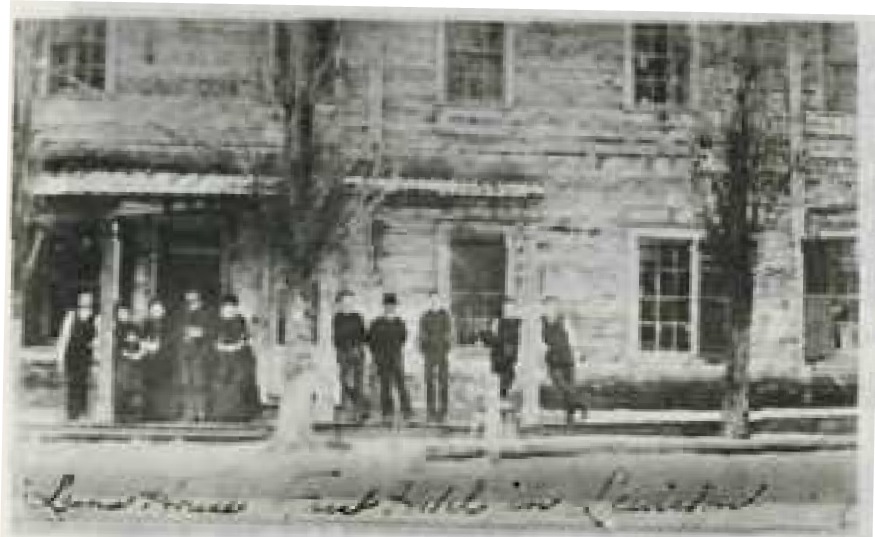launched August 3, 2013
to
project
home page
to Hill Beachey Day Proposed
to research question number 1
to research question number 2
to research question number 3
to research question number 4
to research question number 5
to research question number 6
to research question number 7
to research question number 8
to Hill Beachey Day Proposed
to research question number 1
to research question number 2
to research question number 3
to research question number 4
to research question number 5
to research question number 6
to research question number 7
to research question number 8
8/14/2013
Research Question Number 8: Morphine, really?
Ladd Hamilton (p. 216) wrote of the
morning of the execution of Magruder's murderers: "Upstairs at the Luna House, Father
Brouilette sat with the three prisoners, asking them how they had spent
the night. They had slept well, they said, thanks to the morphine
they'd been given."

Gathering in front of the Luna House
(credit: Michael C. Moore, Frontier Lewiston, 1861-1890, 1980)
This unlikely detail -- whose historical credibility is arguably enhanced by its unlikelihood -- appears in other sources as well.
Welch doesn't mention morphine in her book's Chapter 10. It is notable, however, that she wrote as follows about their final days: "Two accounts, one in the Golden Age and the other in the Walla Walla Statesman, are the only sources of information on how the three convicted men speint their last days in the impromptu jail in the Luna House" (emphasis added, p. 84). Might the morphine detail, therefore, have come from one or both these sources?
The morphine the prisoners were granted is, indeed, a curious expression of the community's gentler instincts. It ranks, in this sense, with Sheriff Fisk's account of tears shed by both Beachey's wife and Hill Beachey himself at the execution.* Yet -- and like so many other aspects of this story -- we cannot be sure of the morphine grant's historical accuracy.
*Fisk's (1910) remarkable account in regard to tears shed at the March 4, 1864 execution read as follows: "Romoin [sic] cried like a child. He had been a schoolmate of Mrs. Beachy, in New Orleans, and that lady wept and begged for his life as only a mother could for the life of an only child. Beachy himself, notwithstanding the active part he had taken in the capture, shed tears of sympathy." The description of Mrs. Beachey's despair at Romaine's execution is particularly surprising, I thought.
Send news to ronroizen@frontier.com, along with any pdfs or other copies of the materials.
New materials, whenever they are appropriate, will be published on this page as they arrive.
I'm looking forward to hearing from you!

Gathering in front of the Luna House
(credit: Michael C. Moore, Frontier Lewiston, 1861-1890, 1980)
This unlikely detail -- whose historical credibility is arguably enhanced by its unlikelihood -- appears in other sources as well.
- Maurice E. Smith's article on the Magruder/Beachey story ("Blood in the Bitterroots," Wild West 10[4], [Dec] 1997) asserts: "On the eve of the execution, the three men asked for morphine and were given it." Smith cited no source.
- A chapter written by Robert G. Waite ("Violent Crime on the Western Frontier: The Experience of the Idaho Territory," pp. ), in a volume edited by Louis A. Knafla (Violent Crime in North America, 2003 ), includes the following re morphine: "Despite the apparent contempt of the condemned prisoners, local citizens did have a Catholic priest 'minister to their spiritual wants,' and he remained with them until the end, the Boise News reported. The night before the execution the prisoners each received morphine to help them sleep" (p. 56).
- Finally, R.
Michael Wilson's account (in his Legal Executions in the Western
Territories, 1847-1911, 2010), offered: "On the night
before the execution each man asked for, and was given, a dose of
morphine so that all three slept soundly, and then spent their last
morning praying with their Catholic priest" (p. 68).
Welch doesn't mention morphine in her book's Chapter 10. It is notable, however, that she wrote as follows about their final days: "Two accounts, one in the Golden Age and the other in the Walla Walla Statesman, are the only sources of information on how the three convicted men speint their last days in the impromptu jail in the Luna House" (emphasis added, p. 84). Might the morphine detail, therefore, have come from one or both these sources?
The morphine the prisoners were granted is, indeed, a curious expression of the community's gentler instincts. It ranks, in this sense, with Sheriff Fisk's account of tears shed by both Beachey's wife and Hill Beachey himself at the execution.* Yet -- and like so many other aspects of this story -- we cannot be sure of the morphine grant's historical accuracy.
*Fisk's (1910) remarkable account in regard to tears shed at the March 4, 1864 execution read as follows: "Romoin [sic] cried like a child. He had been a schoolmate of Mrs. Beachy, in New Orleans, and that lady wept and begged for his life as only a mother could for the life of an only child. Beachy himself, notwithstanding the active part he had taken in the capture, shed tears of sympathy." The description of Mrs. Beachey's despair at Romaine's execution is particularly surprising, I thought.
Send news to ronroizen@frontier.com, along with any pdfs or other copies of the materials.
New materials, whenever they are appropriate, will be published on this page as they arrive.
I'm looking forward to hearing from you!